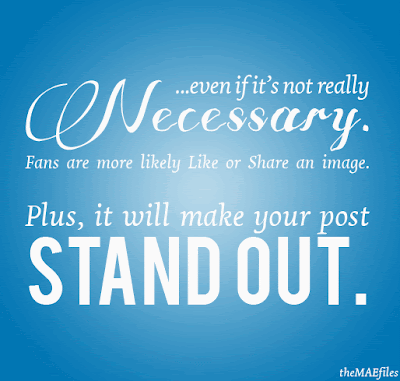For business pages, syncing Facebook and Twitter posts is terrible practice. Posting the same content is fine – but literally duplicating the copy and messaging is not.
By “content” I mean the topic or subject matter of your post,
while by “copy and messaging” I mean actual words used and how the message is framed
(phrase vs sentence, question vs statement, etc).
Why Can't We Duplicate?
Different Character Count
Twitter’s 140 limit forces you to be concise. This may mean sacrificing details (replaced by “Learn
More” + link) or proper sentence structure (use of abbreviations or slang). This may look okay on Twitter, but robotic and auto-generated on Facebook.
Why waste Facebook’s 63,206 character limit? Inversely, posting from Facebook to Twitter results in fragmented and incomplete sentences.
Why waste Facebook’s 63,206 character limit? Inversely, posting from Facebook to Twitter results in fragmented and incomplete sentences.
Your Facebook fans and
Twitter followers could be completely different. Some may add you on
Facebook only and some may add you on Twitter only. This is
because they are looking for different things.
Facebook fans are more likely to comment and discuss their thoughts and experiences with fellow fans, while Twitter followers are more likely to look for quick news snippets or updates. A Facebook user might Share a post so his/her friends will also Like it or join the conversation, while a Twitter user might Retweet a post because he/she feels it is worth sharing (but not necessarily worth discussing).
Different Format: Hashtags and Images
The infamous Twitter hashtag serves absolutely no purpose on
Facebook but to annoy fans (there are Facebook pages about it here, here and here). Your friends may forgive you for
desecrating their sacred walls with your blasphemous hashtags, but the same probably can’t be said for your clients!
Alternately, one of Facebook’s best features is the
ability to attach images and link previews to status updates. Twitter does these too but only if you post directly from Twitter. Even then, users must click “View Photo” to see the image
or preview. Thus, image sharing may not be the best idea for Twitter.

Instead, Rewrite (or Recreate) Your Posts to Fit the Platform
Facebook
Twitter- Utilize the space provided and provide as much info as you can without going over 400 characters (otherwise, fans have to click “See More” to read the rest).
- Ask for feedback, questions, comments, etc. explicitly. Example: Facebook just launched a new feature! [link]. What do you think of it? Share your thoughts below!
- Use images
- Make sure everything, including your URL, fits into the 140 character limit. Link shorteners such as bit.ly and TinyURL are your friends.
- Avoid questions and opt for declarative, imperative (commands) or exclamatory sentences. Example: Facebook Launches New Feature. [link]
- Use hashtags. That way, non-fans can still find you.
There are tons more tips on how
to recreate your content to fit Facebook and Twitter respectively, but these are the most important, basic ones. Have questions or want to share your
thoughts? Drop a comment below!
Til then,
Mae
Mae




Great post Mae, agreed.
ReplyDeleteAlso long time no see, I think we met a long long time ago once or twice at UBC.
Randomly saw this on Linkedin.
MarkZhang.me
Thanks Mark! You're right, it's been a while! I'd ask you how you're doing, but I'm going to hop onto your LinkedIn page instead, like the proper social media prowler I am :p
Delete